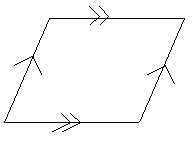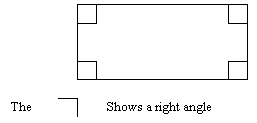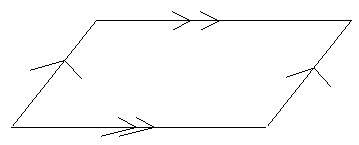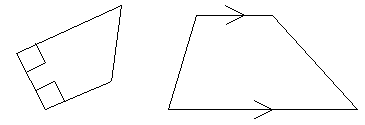
Shapes: Quadrilaterals
Introduction
There are many different shapes. There might seem to be hundreds of different shapes and you could try to learn them all but
This is confusing
This is a waste of time
This is pointless. We need to see what they have in common and what is different about them.
It is much better to concentrate on the properties of shapes. This way you can remember a few facts and them use them to find out more about different shapes.
The 3 properties of shapes that we are going to look at are
The number of sides
The interior angles (the angles inside).
The length of the sides.
These properties help use to remember which shapes are which and why they so called (in some cases).
Let us look at shapes that have 4 sides Quadrilaterals (Quad- means 4).
Quadrilaterals ALWAYS have 4 sides
The interior angles of a quadrilateral add up to 360 degrees.
Here are the quadrilaterals you are expected to know about.
Square
Rhombus
Rectangle
Parallelogram
Trapezium
Kite
That does not seem to many does it. Let us look at the properties of quadrilaterals.
Square
A square has got 4 sides of equal length and 4 right angles (right angle = 90 degrees).
Since ALL the angles in a quadrilateral add up to 360 then 360 divided by 4 must be 90.

So if the length of one of the sides is 5 cm what is the combined length of the other 3 sides?
The answer is 15 cm because 5cm is the length of one side of a square, then each other side must be 5cm . so 5 cm + 5cm + 5 cm = 15cm.
Why do we not just say that a square has got 4 sides of equal length? Why discuss the angles?
Let us look at another quadrilateral and you will see why.
Rhombus
A Rhombus has got 4 sides of equal length and opposite sides are parallel and angles are equal.
(It looks like a square that is being pushed over). The arrows show parallel sides

What is the difference between a square and a rhombus?
The answer is in the angles. A Rhombus has got NO right angles
Now do you see why we have to look at both the side and the angle properties of a shape?
What about another quadrilateral?
Rectangle
The rectangle (oblong) contains 4 right angles (an angle of 90˚).
It has got 2 pairs of equal sides and 4 right angles

In a rectangle, what is the same as a square and what is different?
The rectangle has got 4 right angles (each 90˚) this is the same as a square however a rectangle as not got 4 sides of equal length
Remember the rhombus and how we could squash it down? Well, if we do the same to a rectangle we get the next quadrilateral:
Parallelogram
A parallelogram is a rectangle that has been pushed over. Opposite sides are the same length and they are parallel.

What have a parallelogram and a rhombus got in common?
No angles are right angles.
Some quadrilaterals only have one set of parallel lines. Look at this next one:
Trapezium
What an odd name!

Both of these are types of trapezium. Each of them has different properties in the number of right angles. But each contains 4 sides and one pair of parallel sides.
Not all quadrilaterals have parallel sides. Here is our final member of the quadrilateral family.
Kite
A kite has got two pairs of sides next to each other that have equal length. But none of the sides are parallel.

Well, that is the last member of the quadrilateral family that you will need to know.
Time to review what you have revised. Look at the names below and see if you can remember what properties that they have. When you have thought about all six, click on check your answers and see if you were right.
Square
Rhombus
Rectangle
Parallelogram
Trapezium
Kite
All quadrilaterals have 4 sides
A square has got 4 sides of equal length and 4 right angles (right angle = 90 degrees).
A Rhombus has got 4 sides of equal length and opposite sides are parallel and angles are equal.
The rectangle (oblong) contains 4 right angles (an angle of 90˚). It has got 2 pairs of equal length sides
A parallelogram is a rectangle that has been pushed over. Opposite sides are the same length and they are parrallel.
A trapezium as got one pair of parallel sides.
A kite as got two pairs of sides next to each other that have equal length.
That is it for today. Well done!